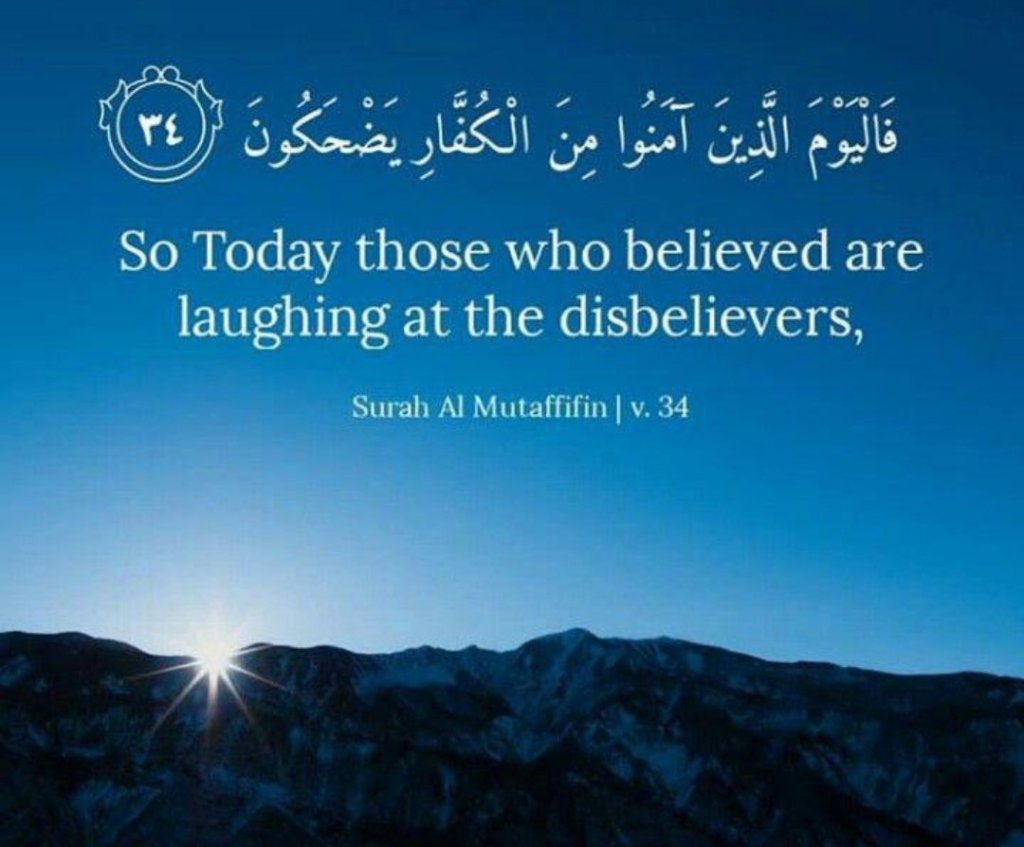
Surah Al-Mutaffifin is a Meccan Surah with thirty-six verses. Mutaffifin means Those who deal in fraud. It is named after the word Mutaffifin used in the very first verse.
The style of the Surah and its subject matter clearly show that it was revealed in the earliest stage at Makkah, when surah after surah was being revealed to impress the doctrine of the Hereafter on the people’s minds. This Surah was revealed when disbelievers had started ridiculing the Muslims and disgracing them publicly in the streets and in their assemblies, but persecution and manhandling of the Muslims had not yet started.
The basic theme of this Surah is Hereafter. And subject matter comprises of,
1. It seriously warns and threatens the defrauders.
2.It points to the lack of strong belief in the Resurrection as being the origin of corruption and great sins.
3. There are some hints in this Surah showing the end of the Wicked on That Great Day.
4. It points to some of the great gifts and delightful blessings of the Righteous in the Garden of Bliss.
5. The unbelievers, foolishly mocking at the believers, in this life, and the reverse situation, in the Hereafter is briefly referred to in the Surah.
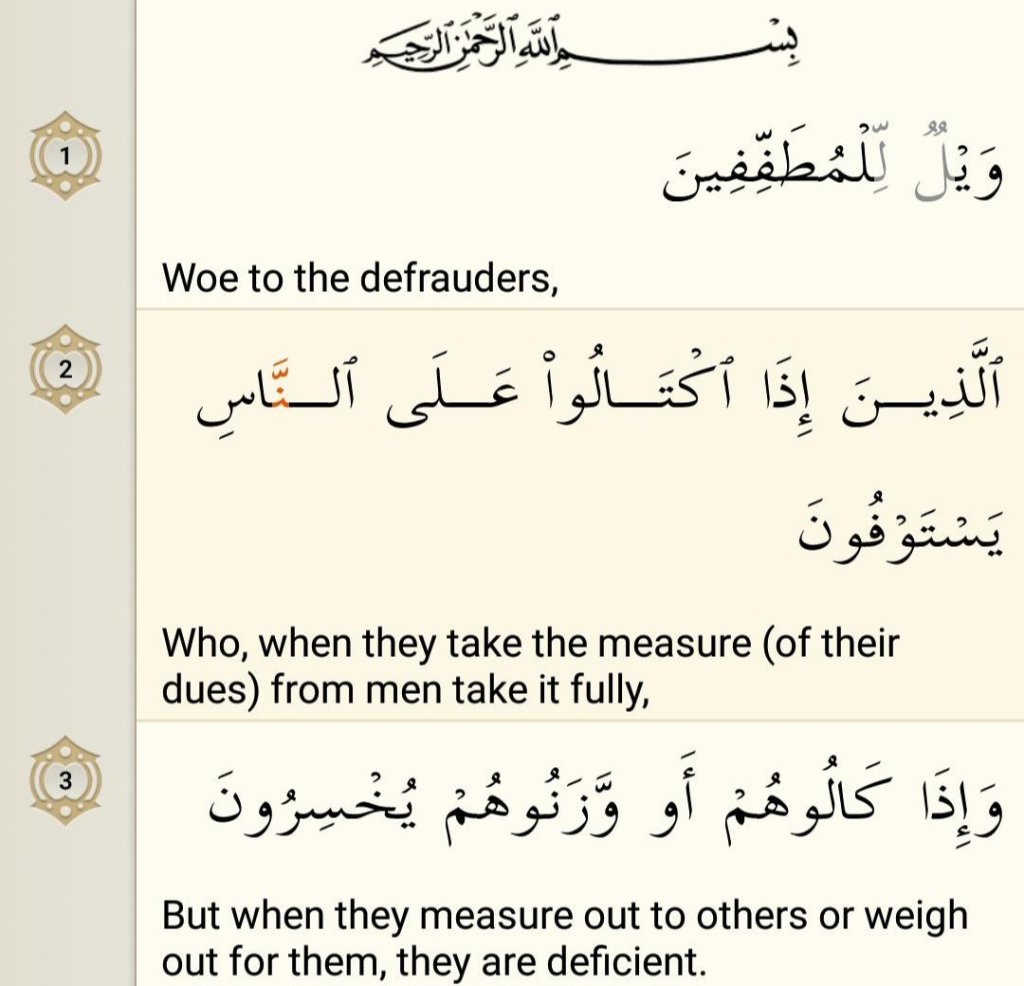
The Surah begins with a profound declaration against a certain type of criminal. The word mutaffifeen comes from tafafa and a doer of tafafa is a mutaffif, a person who when in business will try to get a little more than they deserve when purchasing something and give a little less than they should when selling something. This is done in both tangible and intangible things. For example, in services you might owe someone five hours at work, but you want to get away early and give two minutes less as you think no one will notice – two minutes is not a big deal. Or you have to give someone one kilogram of rice but you put a few grams less on the scales. This is the mutaffif who gets away with so little that the person that gets swindled can’t even come back and complain that he never got the exact right amount, as it will seem petty. So it’s not about taking huge amounts unjustly, but about taking little amounts unjustly and unfairly.
Wayl is an Arabic word for cursing someone, where one wishes harm and destruction upon someone such as an illness. It’s also a word used for someone who has been ruined and is at a loss for words and does not know what else to say except ‘ya waylanaa!’ meaning ‘destruction has fallen on us’. Here ultimate and horrible destruction is for those who engage in this crime of giving less than you should and taking more than you should.
This point is also notable that though the verses speak about shortchangers, undoubtedly ‘fraud’ must be taken, here in a more general sense: It consists of giving short measure and short weight, but it covers much more than that. It includes any shortchanging in numericals, (the countable items which are sold one by one). Or, it may include lazy workers or employees who do their duty insufficiently: so the verses condemn even them.
Some commentators consider a broader scope for the meaning of the verses. They say that any changes in ‘limits set by Allah’ and any deterioration in social relations and morals may be involved. Although there is no clear implication about them in the verses, but still the idea is not inappropriate.
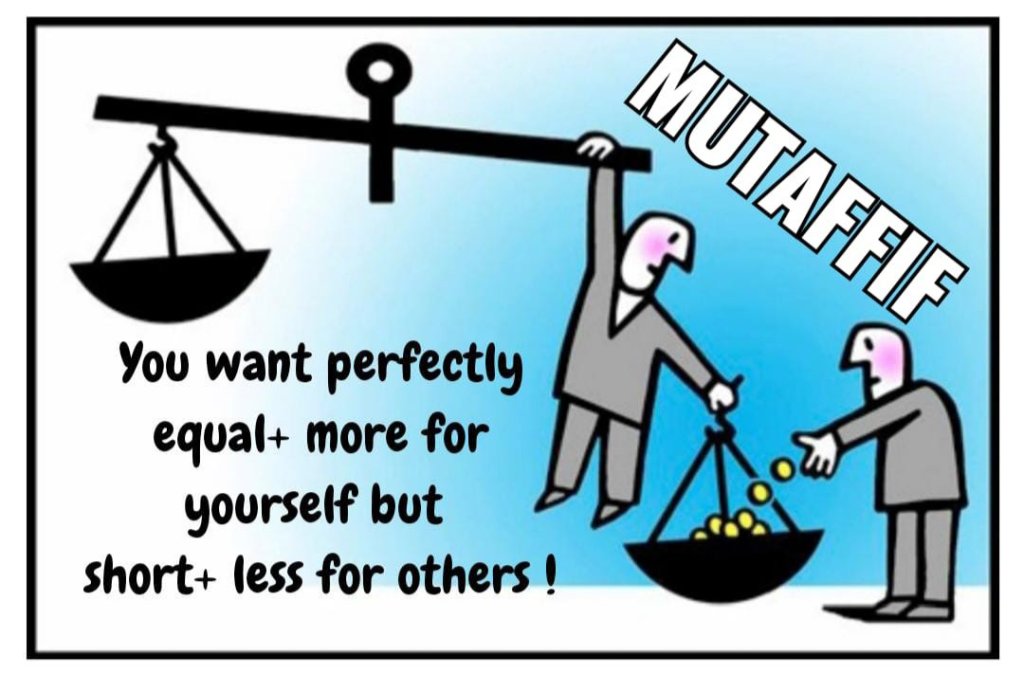
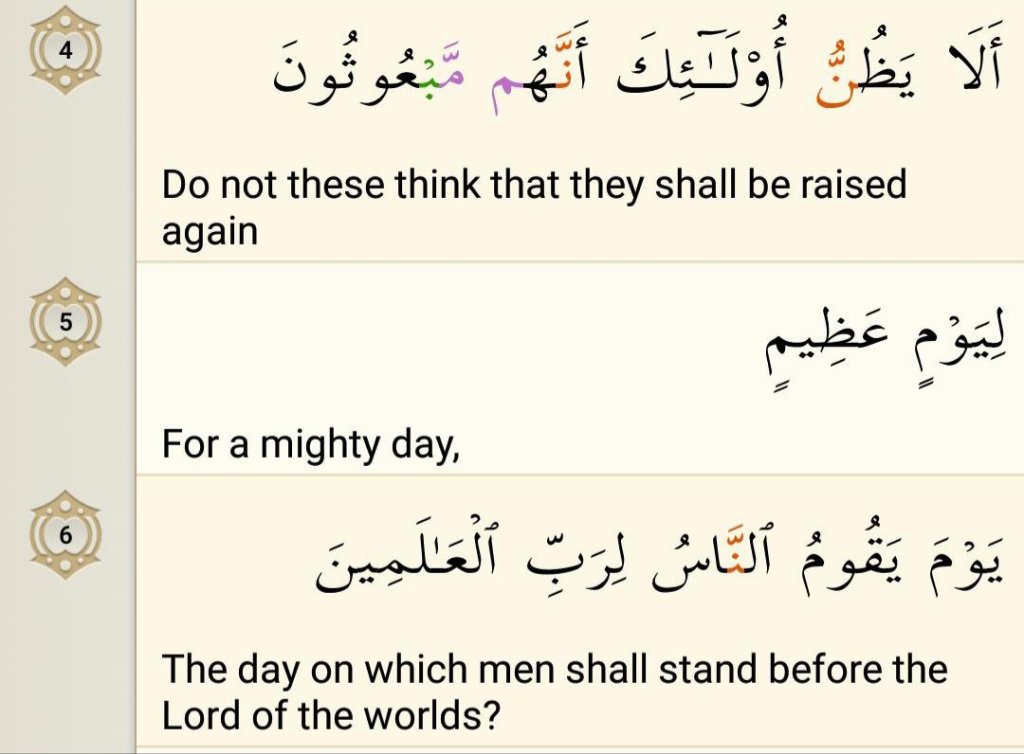
Now Allah says that the Mutaffif who is very trained at cheating others, doesn’t he know that there will be a day for which he has to appear before the Lord and there he can not cheat, escape or trick for his benefit.
These people are wrong in thinking that they will be let off without being called to account when they have committed such and such crimes in the world. They develop this mentality over time, at first when they cheat others they are a little nervous, the next time a little more confident and a time comes when this cheating and fraud becomes a habit and they even forget that there is a Lord who watches over them. They can escape in dunia, but not in Akhriah. For a mighty day they have to be accountable for their deeds, standing infront of none other but the Lord of the Worlds!

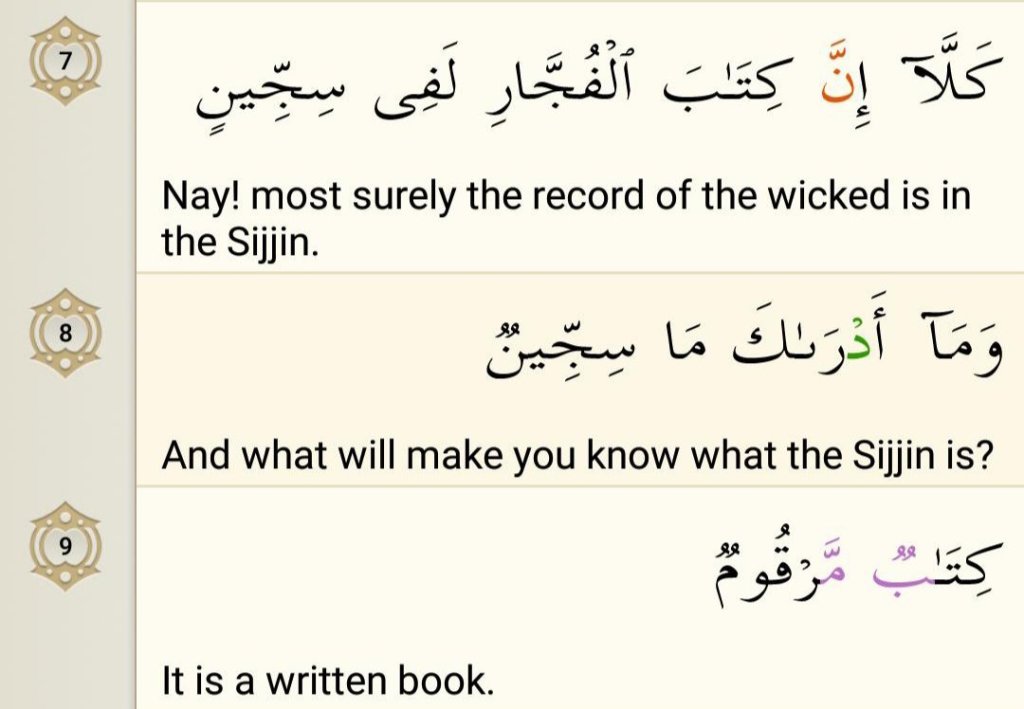
What is Sijjin?
The word sijjin in the original is derived from sijn which means a prison and it implies the general Register in which the actions and deeds of the people worthy of punishment are being recorded.
In these verses Allah informs us where the record of all the evil deeds of evil people (Fajir) is kept. Faajir is someone who is extremely rebellious and tears through the sanctities of Allah’s boundaries without fear of consequence. Allah informs us that this rebellion and violation have been written and documented in Kitaab al Fujjaar which is like a register. The ulema have commented that this is like dungeons or prisons underground where there was an office with a register. This register had information of which prisoner was incarcerated, what punishment they were to receive, how long they would have to stay there, what cell they would stay in etc. There are different views among the Musfasirun about the concpet of Sijjin. Some say this is just the record as these verses state, some say this is record as well as the abiding place of the wicked souls therewith, and this all is the life of Barzakh. As these are concepts of Mutashabihaat ( the unseen) we can only believe in it as the Quran states, rest the reality of how all this happens, is only fully known to Allah.
Then Allah asks what really makes you think what Sijjin is and then it continues it is the record being imprinted. For which the word Marqoom has been used. Marqoom means to write something in thick clear writing and to imprint it so that it cannot be erased. This word is also used to describe stitching embroidery onto clothes, as it is not something that you can easily remove or erase afterwards. Thus, marqoom implies that not only will this data be recorded accurately it is protected and cannot be erased. A person may feel content in thinking that no one had seen his sin or crime but that does not take away from the fact that it has been documented and sent forward.
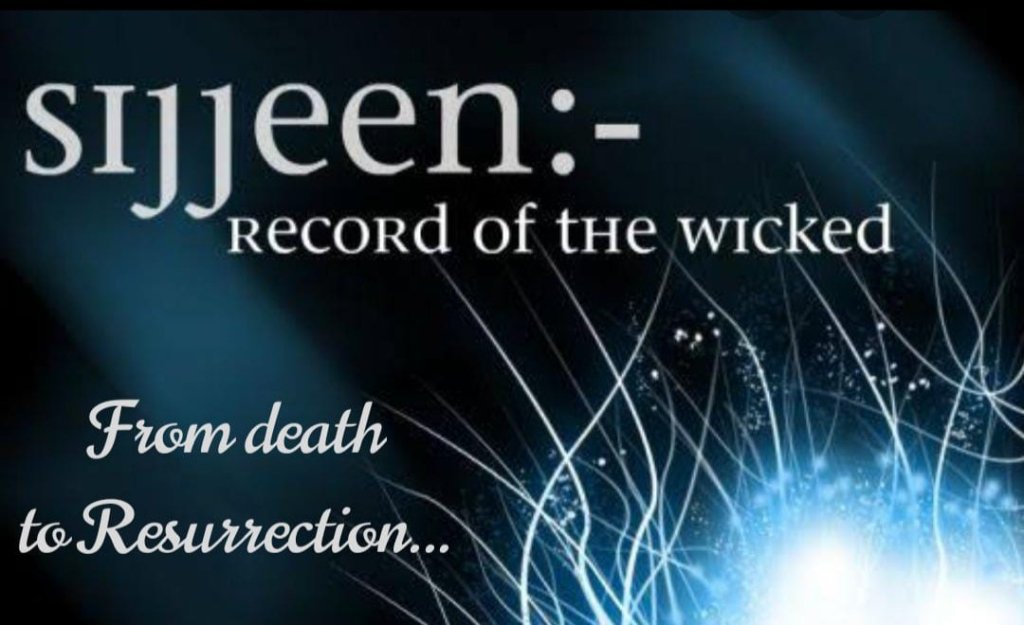
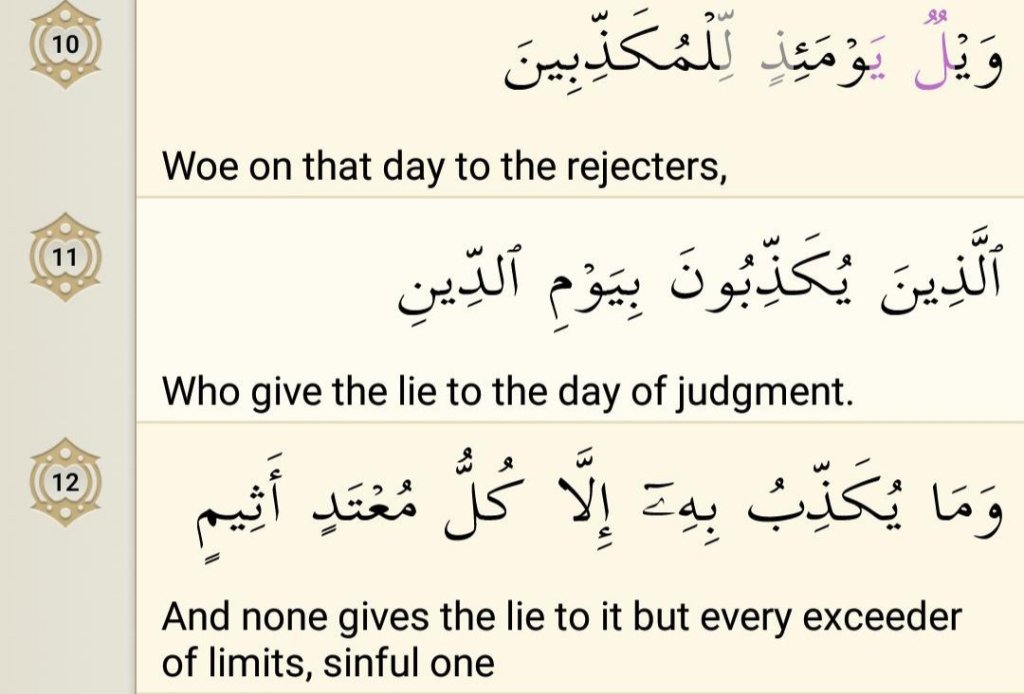
Now Allah says woe that Day (Day of Judgement) to the deniers. It is the denial from which the various sins, including dealing in fraud and transgression, originate. In the first verse Allah said “Woe to the defrauders”, and now it is said “Woe, That Day, to the deniers”, which meaningfully points to the kinds of painful and horrible chastisements awaiting them.
Then it continues those who deny the Day of Judgement. And none denies it but every Transgressor, the Sinner. It means that the denial of the Day of Judgement is not based on reasoning and logical thinking, but those who want to be oppressors, whenever they wish, and to be the sinners of any corruption, take joy in denying the Hereafter. They want to continue their evil deeds, freely and without thinking about their responsibilities. They do not pay attention to their conscience. They know no laws!
What is Mu’tad and Aseem?
MU’TAD (Transgressor)
The word mu’tad means to violate someone’s rights. The mu’tad is therefore the one who crosses limits and wrongs people over and over until it becomes second nature to him and to the extent that he is proud of this. This is how tyrants are created on this earth, whether they rule countries, a business or their household.
ASEEM (Sinner)
Aseem means the one who keeps himself from doing good things. It is primarily an issue of the heart and in this case the heart is not at all inclined to doing good and this person actually feels uncomfortable in doing good deeds. It’s also narrated in a Hadith that goodness is what that will satisfy/relax your self (nafs), and ithm (sin) is what will eat away at your chest (your heart). If you persist in the characteristics of Ithm (continuous sins), you will become aseem and get stuck in this state. Every chance this person gets to do evil and violate someone’s right he does so and every chance he gets to do good he pushes away.

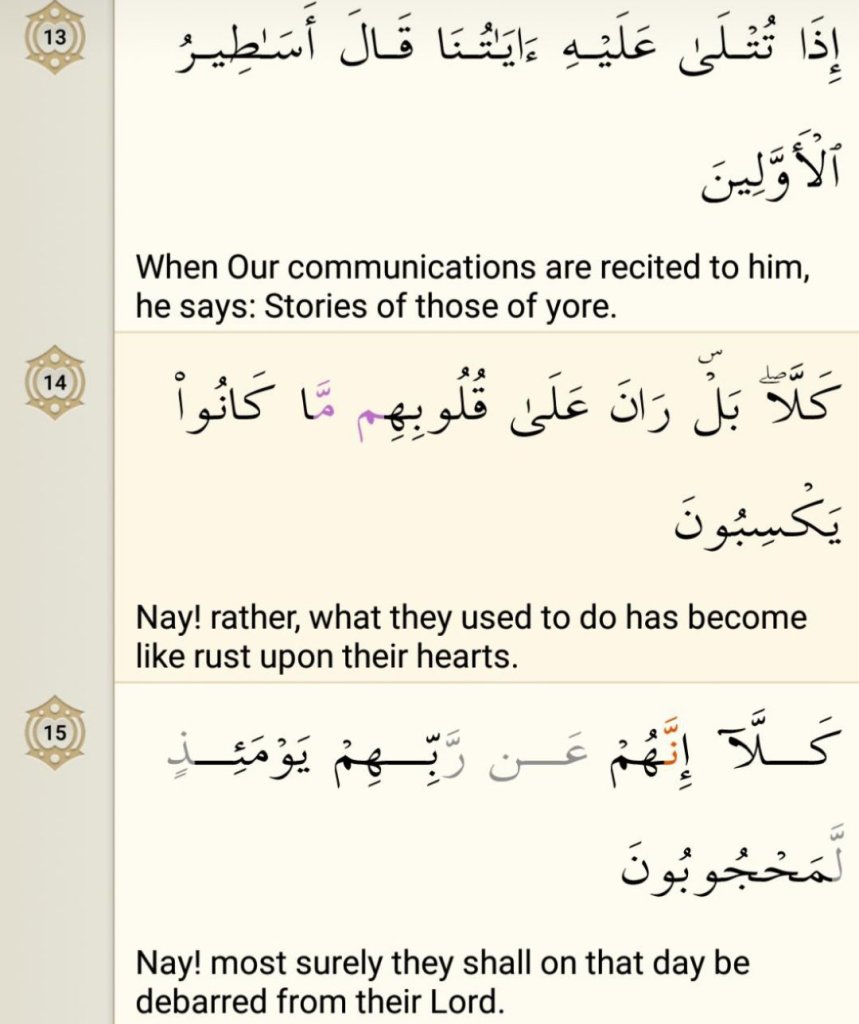
They call it stories of the past…
Further mentality of the deniers is highlighted now. Allah says that they are not only Transgressors and Sinners, but mock the Signs of Allah and say that they are old myths like a series of ancient stories belonging to the very early periods of man, which have no real value. In this way, and under the pretext of calling them myths, they want to withdraw themselves from the duties that the verses of the Quran define for them.
The sinners raise the subject as an excuse to flee from the truth and do not accept Allah’s invitation.
These verses were revealed centuries ago they are still relevant in our society. The sinners would be condescending to the verses of the Quran and dismiss them as stories and try to make the speaker feel ridiculous making him a faajir. This applies to people today just as much as it did then.
Their hearts have rust over them…
Allah informs us that their heart is covered with raan, a rust imprint that covers their hearts. The heart becomes black through committing sin after sin. And this is the rust through which their senses and understanding of Divine revelations is completely blocked. The explanation of this rust as given by the Prophet pbuh that:
“When a servant commits a sin, it marks a black stain on his heart. If he offers repentance, the stain is washed off, but if he persists in wrongdoing. it spreads over the whole heart.” (Musnad Ahmad, Tirmidhi, Nasai)
They will be blocked from seeing Allah that Day…
Allah then says that they will be permanently blocked from seeing their Master that Day. They called the glorious Revelations of Allah a lie so how can they see their Lord now? This verse is a proof that the believers will in fact see their Master. When the sinners are blocked off from seeing Allah, He will show his full glory to the believers. This ayah is both a punishment to the disbelievers, and a blessing to the believers.

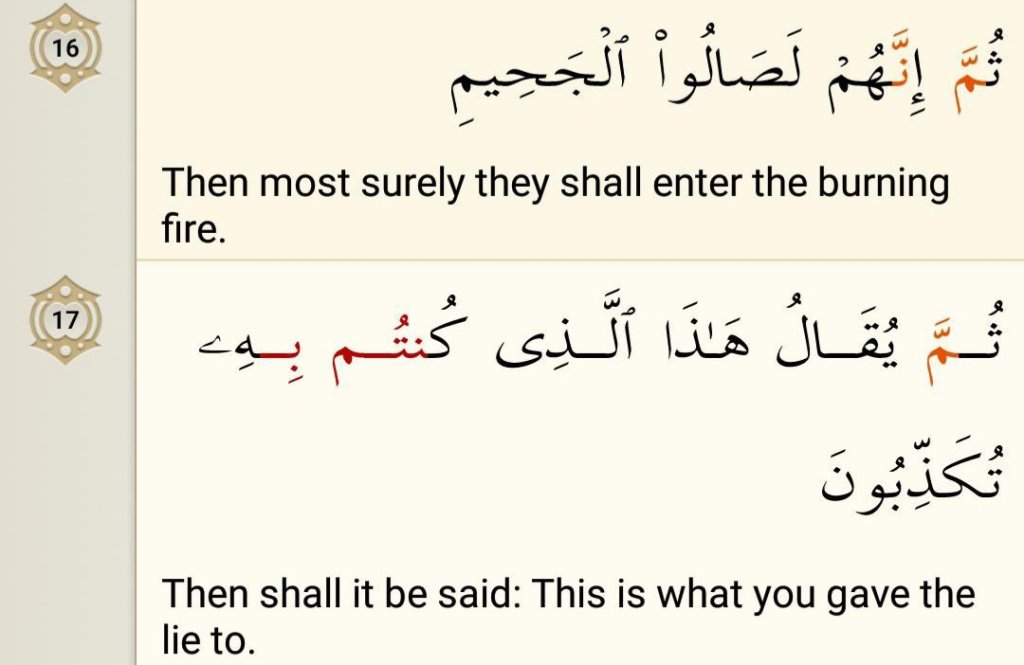
Allah has mentioned the crimes earlier and the worst punishment is mentioned now, which was the sealing of the heart, came after the disbelievers had poked fun at His verses. This arrogance resulted in their hearts becoming rusty, in them being unable to see their Master and will eventually lead to them throwing themselves into the hellfire. This self-destructive sinner undermines himself and ruins his own happiness by his own hands.
Not only they are thrown in the fire but also it will said to them as if reminding them of all the scenes of their evil how they used to poke fun at the Revelation and call it a lie. So that Day it will be said to them now this is what you gave lie to, adding to their state of regret and loss!

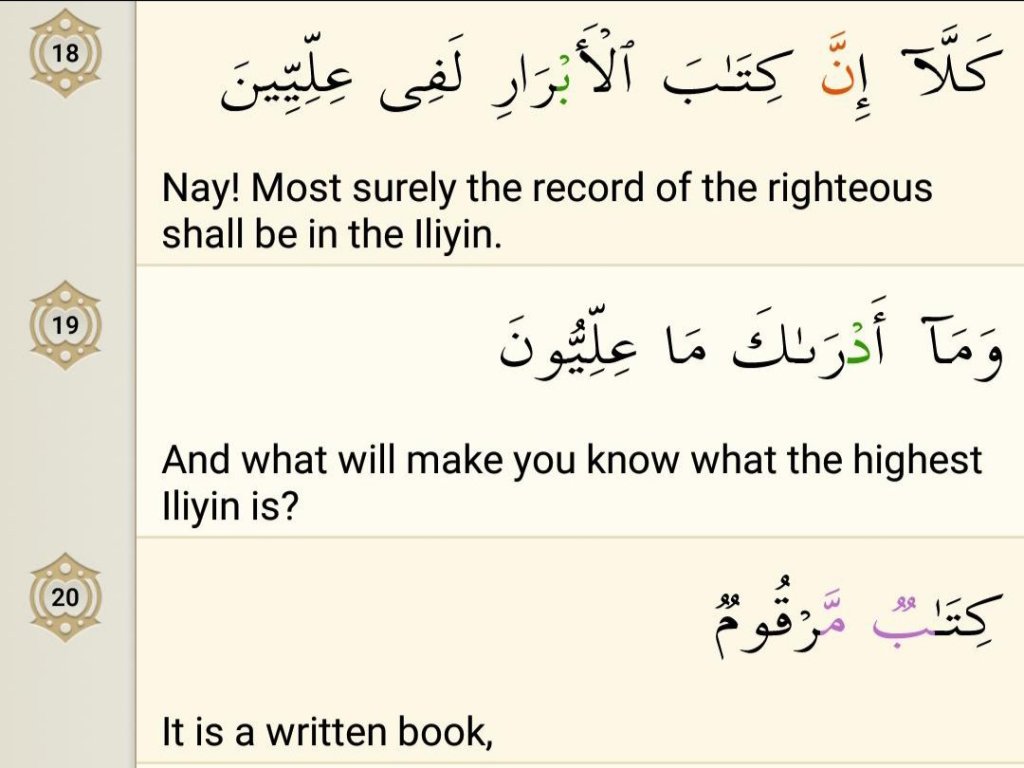
With this verse Allah switches from discussing the disbelievers to the believers now. The word abraar is used for the righteous people here, as the righteous will be fewer in number on that day compared to the wicked. The righteous whose record is going to be in Illiyeen and this has been interpreted in a number of ways just as we had various interpretations of the term Sijjin in earlier verses.
The word illiyeen comes from uluw which means height. The implication is that this book will be in the company of the highest, the angels, and we know that the higher the angels are, the greater in nobility they are and the more responsibility they have. The high group of angels referred to here are responsible for guarding the book of the righteous. Additionally, it is commented that this place is an honoured place found in the highest part of Jannah as well as referring to the high positioned angels. The soul of the believer according to a number of mufassiroon is taken up through multiple heavens until it reaches underneath the throne (arsh) of Allah and there underneath the arsh is the Illiyeen where the record is kept. And it is also commented that the records as well as the souls of the believers both are kept in Illyeen till the Day of Resurrection, and again this is the time of Barzakh!
Allah then asks here what can you find around you that can possibly help you imagine and visualise what illiyun is. There is nothing around us that will give us any idea what this lofty place is and how secure that record is.
Marqoom implies that not only will this data be recorded accurately it is protected and cannot be erased. This verse has same details as mentioned earlier in discussion of Sijjin.

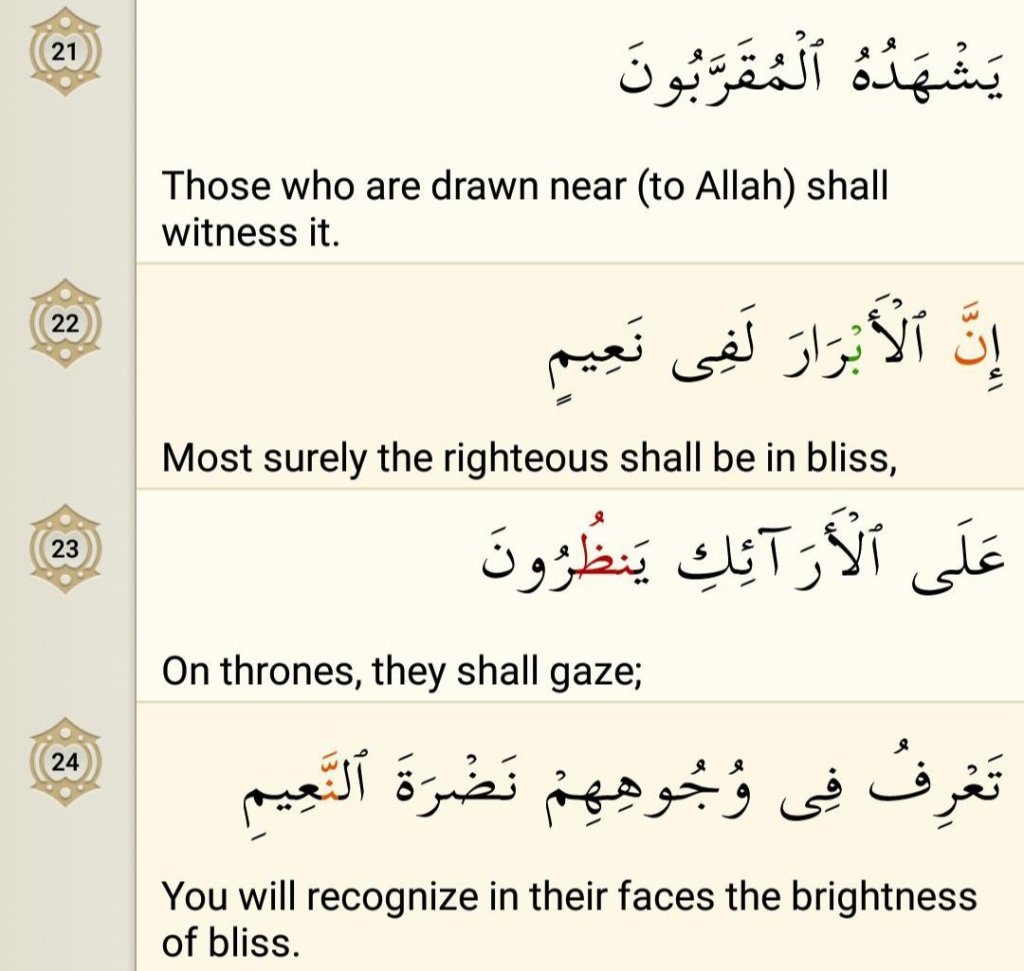
And the Believers lived happily ever after…
These verses express clearly, that a special group of the elected believers are ‘the ones Nearest to Allah’ who possess a very high rank and are witnesses to the records of the others from the Righteous. These will be the people who are entitled to be living happily ever after!
Allah informs us that the closest to him, i.e. the angels, are a witness to this book (nama-e-amaal). These books are under their surveillance and they are a witness that these are the deeds of the righteous. They are guarding it as it contains within them the guarantee and security of safe passage for these people into paradise and that they will not be people of hellfire. The angels close to Allah have born witness to this persons closeness and righteousness.
Glimpses of Paradise…
Allah now moves on to give a few glimpses of Paradise. That is, they possess the blessings and comforts that are indescribable. And this is a complete and hidden definition referring to the whole material and spiritual blessings of Heaven. The believers shall be in eternal bliss!
On beautiful relaxing thrones…
The word aareeka is singular of araa’ik which is a chair, throne or couch that is full of cushions so that you can recline on it and relax. Allah is saying that the righteous will be comfortably reclined but still have the best possible view and wherever they look they will see bliss. Also, when we look at something our vision is usually restricted to one thing yet in paradise the believers will be able to see all around.
With the glowing happy faces…
The word naddrah is used to describe the lighting up of one’s face to the extent that you can see the freshness and joy on it. It is also used in Arabic for vegetables that are ripe and fresh but in the Quran it is used for faces. So the faces of these people that are sitting on couches in Paradise are lit with joy and happiness at being there and it’s the blissful things they see wherever they look that lights their faces up.

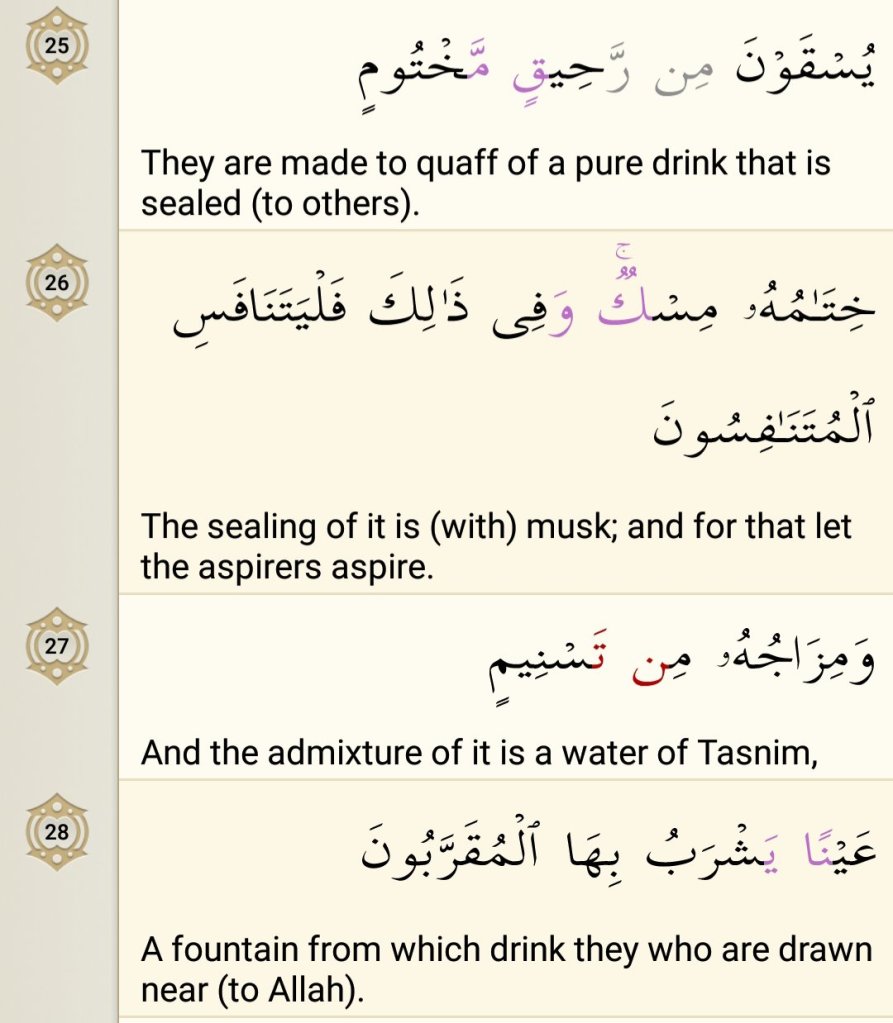
Raheeq-al-Makhtoom!
Allah has set the scene with the successful ones reclining and relaxing on their seats and being given drinks. Raheeq is the purest possible wine or drink, which is not contaminated by age or impurities, is crystal clear with great texture and colour, a beautiful smell and it never makes you drunk (no matter how much you drink). The word makhtoom means sealed and tight and thus this drink has been filled to the brim and then sealed waiting for the righteous to open and drink from them.
You get to open the bottles first…
Moreover, the use of such complete containers or bottles is a high honor and respect to the guests of Jannah; a sealed container whose lid will be opened only by the guests. Imagine the protocol! The pure drink of Heaven is not the same as the sealed wine bottles of this world which are closed tightly sometimes with a wafer of molten wax (or clay) into which is pressed the distinctive seal of the sender or the company, that may make the hands dirty when opening them, but it is sealed with musk and, when it is being opened, it smells like the perfume of musk.
Added with Tasnim…
Allah takes our imagination to an even higher level. When the Arabs would mix something in their drink to give a different taste (for example, adding cocoa or sugar to milk) it was called meezaaj. So this wine Raheeq will have a tinge flavour of Tasnim. Tasnim will be a fountain flowing down from a height in Jannah. The flavour added to this drink has been added from a very high fountain or waterfall of Tasnim. So, the drink itself is not tasnim but it has a little flavour from it. When you taste the tasnim in your drink and enjoy and marvel at it you wonder what it is and where it came from, as you’d like it in its pure form.
Race the path of goodness…
Allah says let those who want to compete and race in path of goodness, shall run for this cause and goal. People run and compete for different things, but Allah is urging us to race this path whose destination is Jannah!

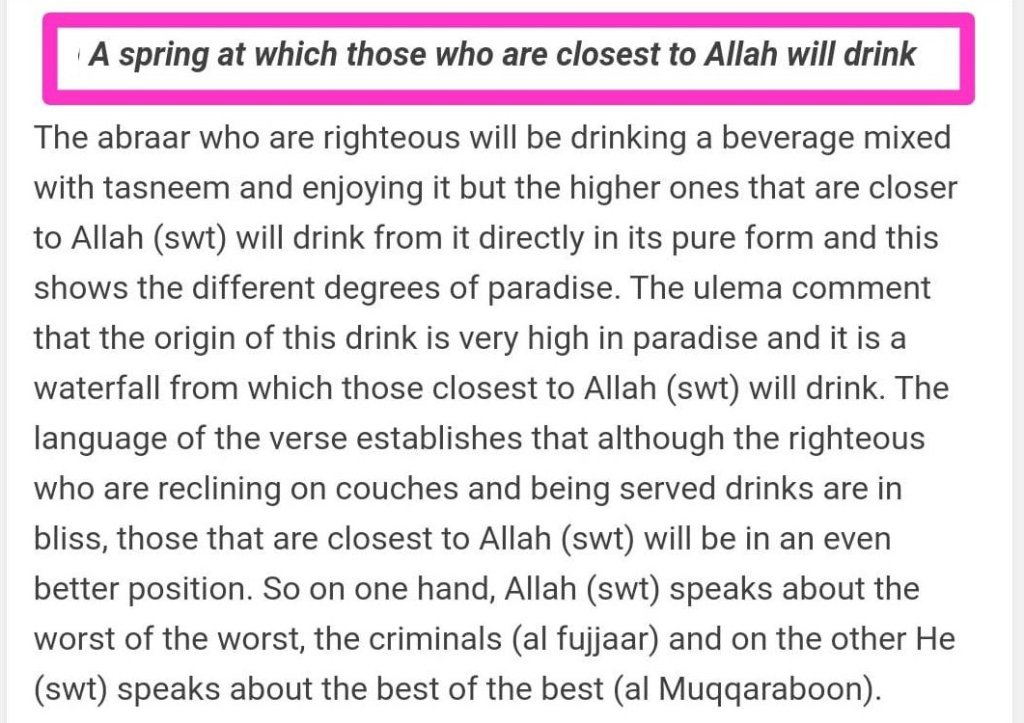
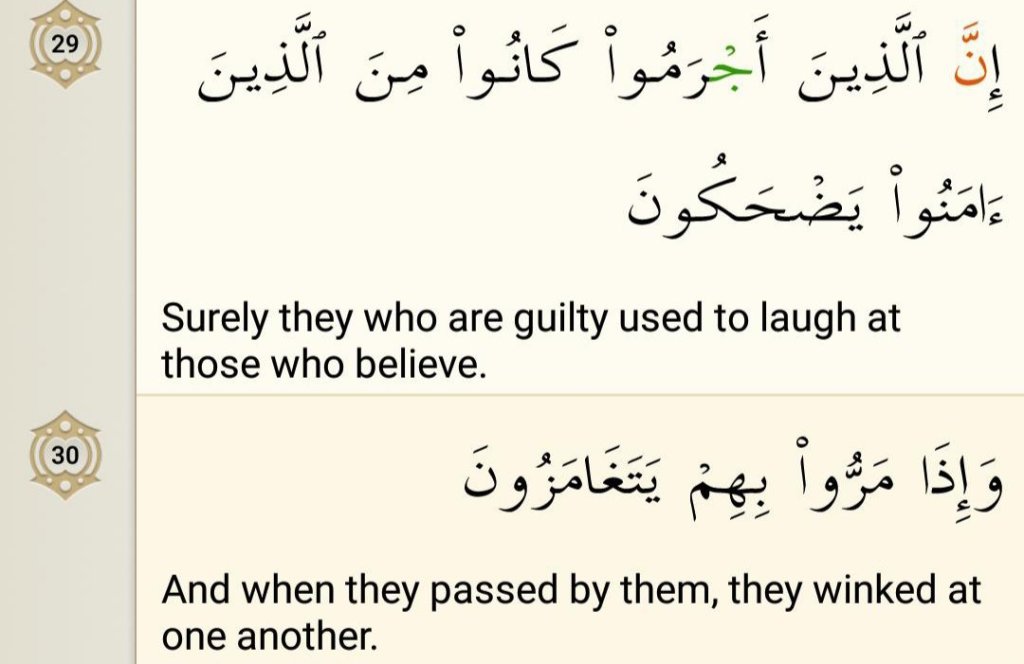
The previous verses talked about the great rewards and the blessings of the Righteous, while these verses point to a part of the troubles and the difficulties that the believers may be faced with, in this life, for their Faith and Righteousness, to show that those great rewards are not undue.
These verses speak about the position of the pagans and their revolting treatment against the believers. Four varieties of their revolting behavior are mentioned here:
1. Laughing at the believers…
The disbelievers used to ridicule the believers. They arrogantly laughed at them to insult them. And the wicked have always been in this world, smug against the believers. This is also prevalent in our times where Muslims are made fun of for their faith and belief in the rewards of paradise. Muslims should have confidence in the promise of Allah which is real although others may mark it as fantasy.
2. Winking in mockery…
When the disbelievers passed by the believers, they used to wink at one another in mockery. In this way and by these acts and sarcasm’s the disbelievers, having evil motives, want to say that: ‘Look! these poor people say that they are the nearest to Allah and claim that the divine verses are revealed for them. Look! these foolish people say that the dry and rotten bones will be called to life again!’. Disbelievers usually say some nonsensical words like this.
It seems that the disbelievers sarcasm was obviously done when the believers passed by them or they passed by the believers. And since they could not laugh at the believers and mock them easily, they winked and made gestures to convey their thoughts to each other. But, when they were in their own gatherings and the believers passed by them they could commit their evils more freely and boldly.
Next two evil traits will be covered in upcoming verses inshaAllah.

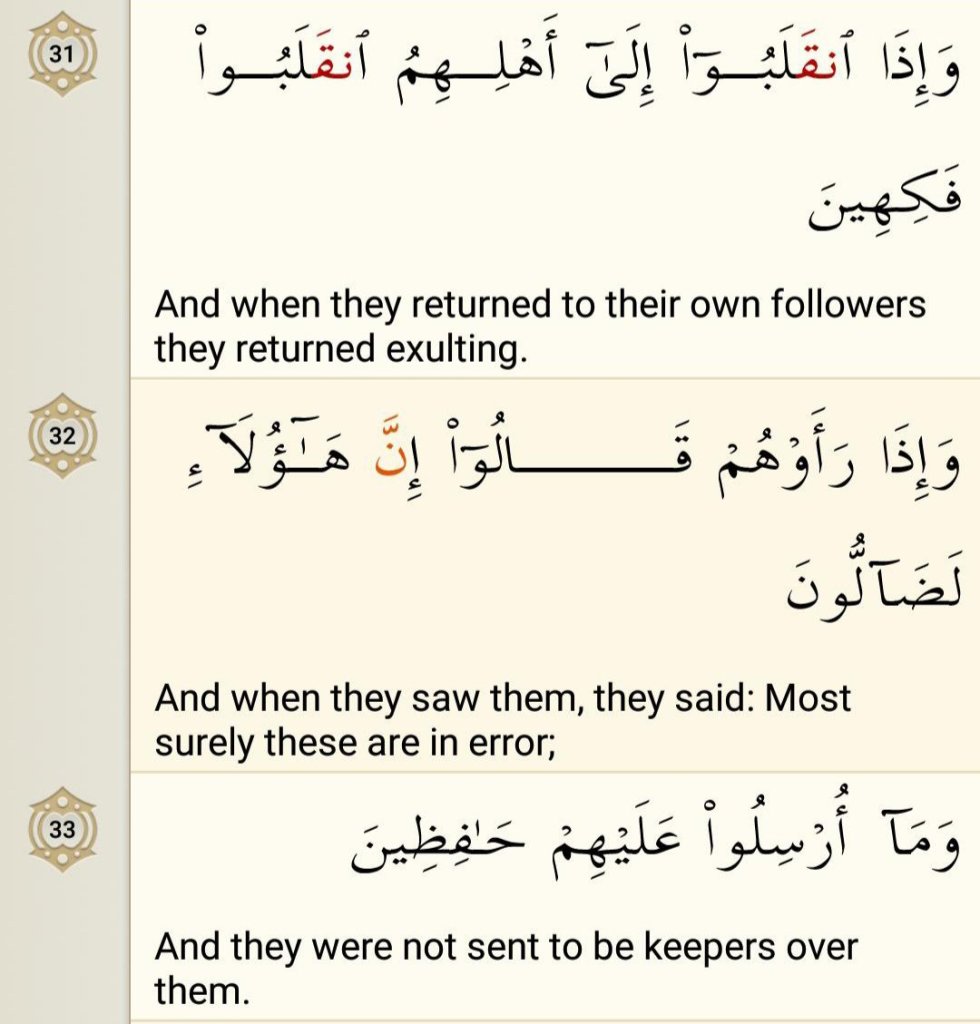
This is continuation of the previous subject of how the disbelievers make fun of the believers.
3. Returning to their friends and family jesting…
When these disbelievers returned to their people they returned jesting. They talked to each other so proudly and boastingly as if they had won a great victory. Now when they had finished ridiculing the believers they go to their family full of joy and relish in relaying information on the insults they have made. Faakiha means delicious fruit and comes from the verb fakiha which means to be overjoyed, as a person feels good when he eats fruit. Thus, the disbelievers so enjoy ridiculing Muslims it is as if they can taste fruit in their mouth and almost taste joy when they insult them. They share these stories of how they mock the believers with their family. But in Akhirah this evil person will flee from his family, the family that he so enjoyed meeting in dunia.
4. They labelled the believers as misguided…
Since the believers had left the belief and the worship of the gods that the unbelievers used to follow, so the disbelievers thought of the believers Faith as a wrong way and said that they had gone astray.
The type of behavior that the disbelievers had may refer to the early period of Islam, when they did not think of the Divine Religion as a serious and everlasting one. Therefore, they laughed and mocked it.
But gradually when groups of people came to Islam and the disbelievers felt threatened, they stood firmly and step by step they intensified their enmity. This depicts the first stage of their enmity against the Muslims; the one that gradually changed into several bloody battles in later stages. Since the believers were mostly from among the poor people who had not possessed high ranks in their society or a great deal of money, the disbelievers regarded them as lowly and counted their faith unworthy, and consequently mocked them and their belief.
Why are these disbelievers so interested in their faith?
Then Allah says with what right and according to what rationale do they find fault with the believers? They had not been sent as guardians over the believers so why should they be so concerned with whether Muslims are lost or not, with how they live or what they aspire to. What makes them think they have this authority? This authority is only of Allah Alone to be a guardian over deeds!

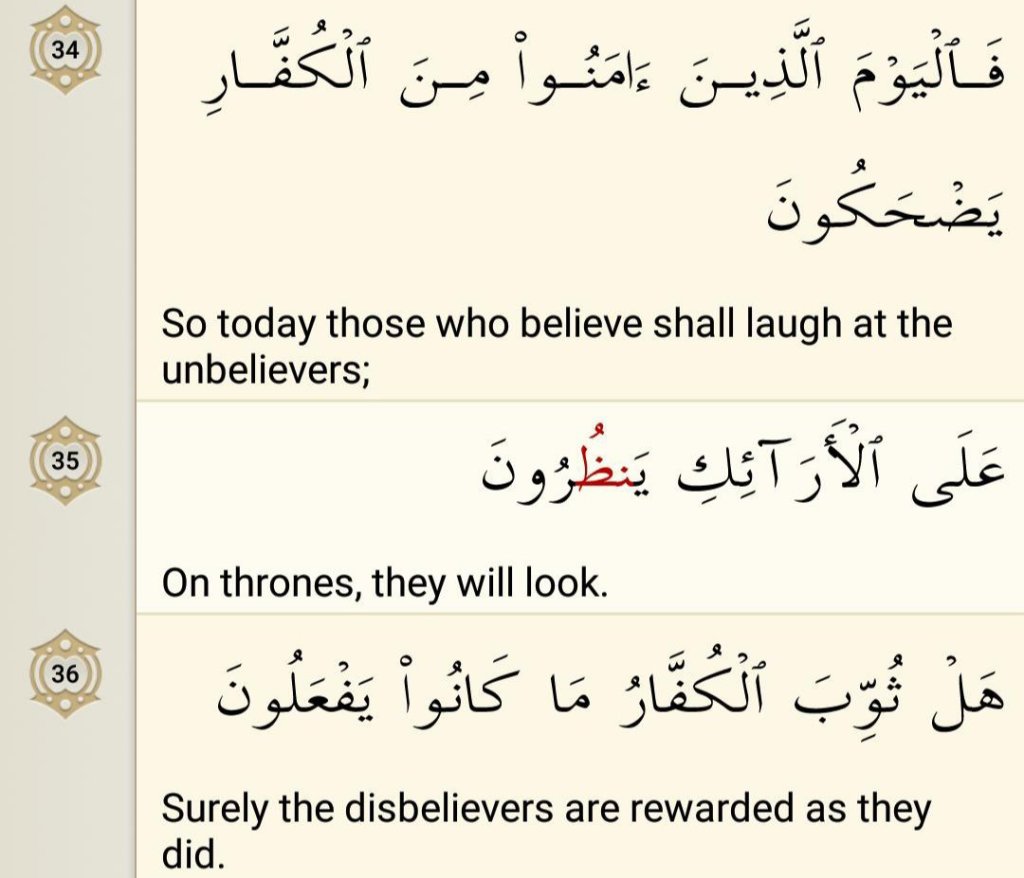
On that Day the believers will laugh at the disbelievers because the Day of Judgment is a day that, according to Divine Justice, everyone will receive the results, of his own deeds, which he incurred in this world. All these tricks and falsehoods will be shown or what they really are, and that is why the believers will laugh at the disbelievers which is itself a kind of painful punishment for the arrogant ones.
They will be on high couches reclining and looking around with a full view of everything. What will they be looking at? They will be looking at the immense Blessings of Eternity and Allah’s endless Grace, the Dignity and Respect together with the calmness they have in Heaven, and at the painful chastisement that the obstinate arrogant disbelievers are faced with in Hell.
Allah displays sarcasm in the last verse and asks if those who disbelieved have been paid a good salary in return for everything they used to do. This sarcasm is the response to the claims of the arrogant disbelievers, who expected to receive rewards and prizes from Allah for their vices. They used to mock both the Believers and the Messages of Allah, so on that Day, they should be paid back for their mockeries which they committed in this world.
